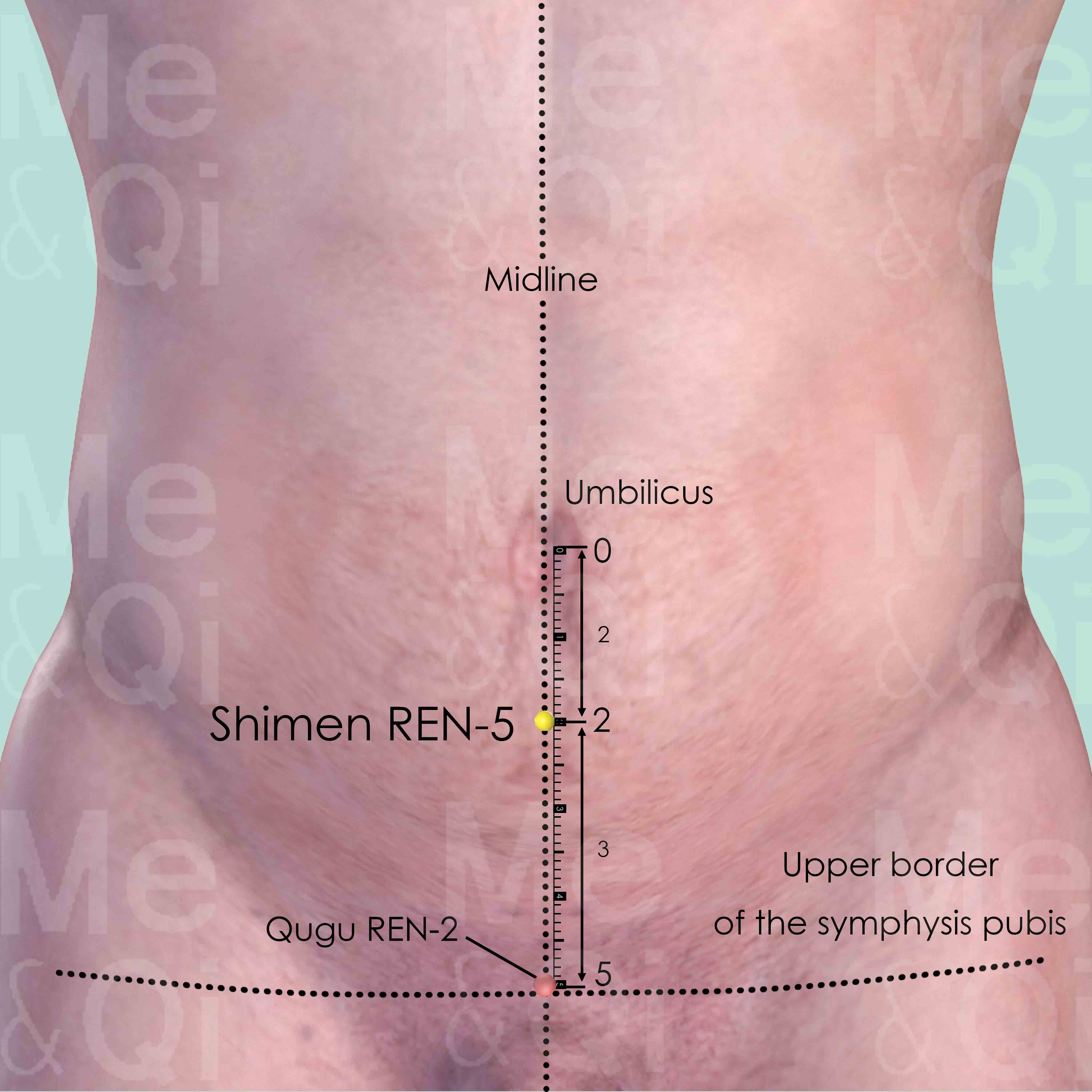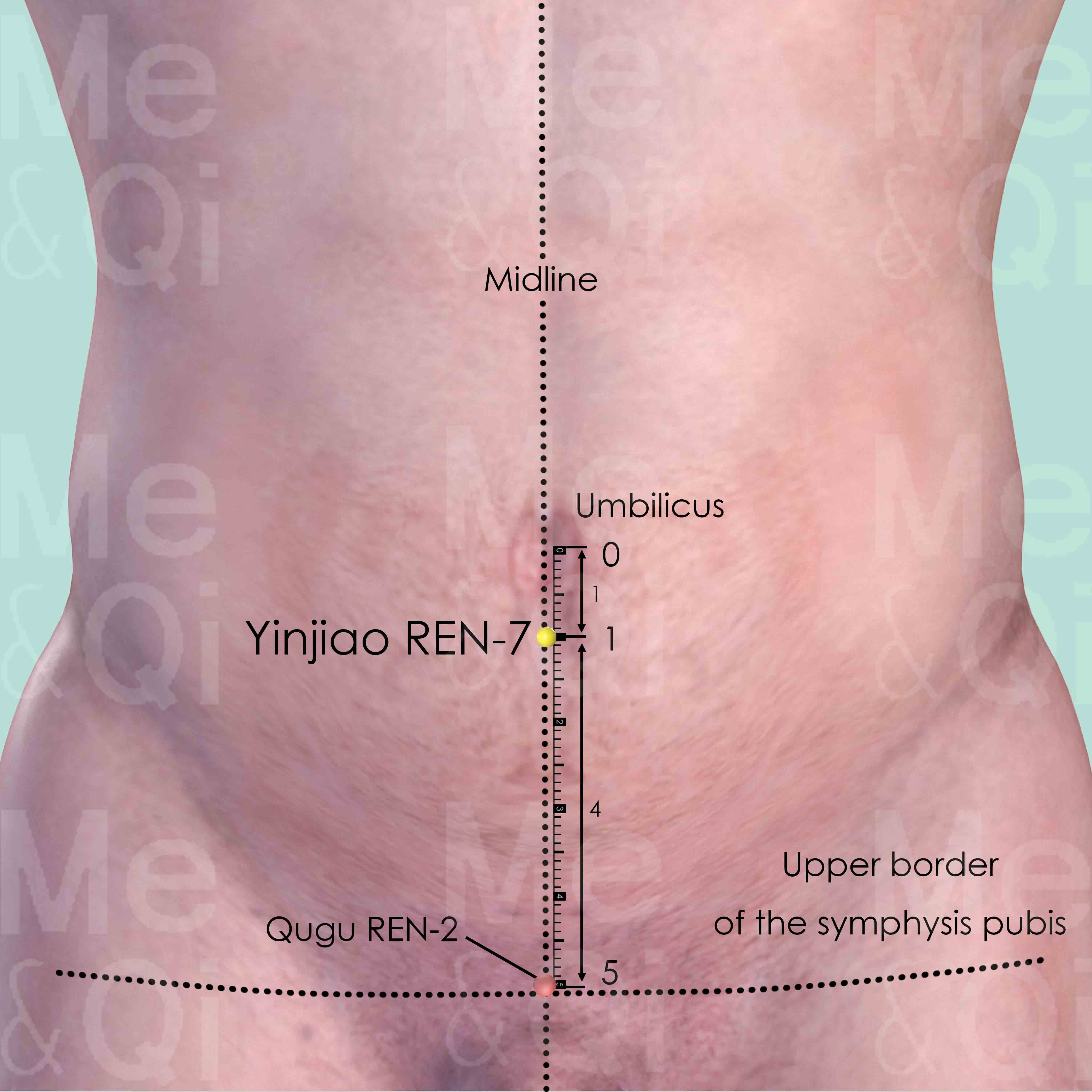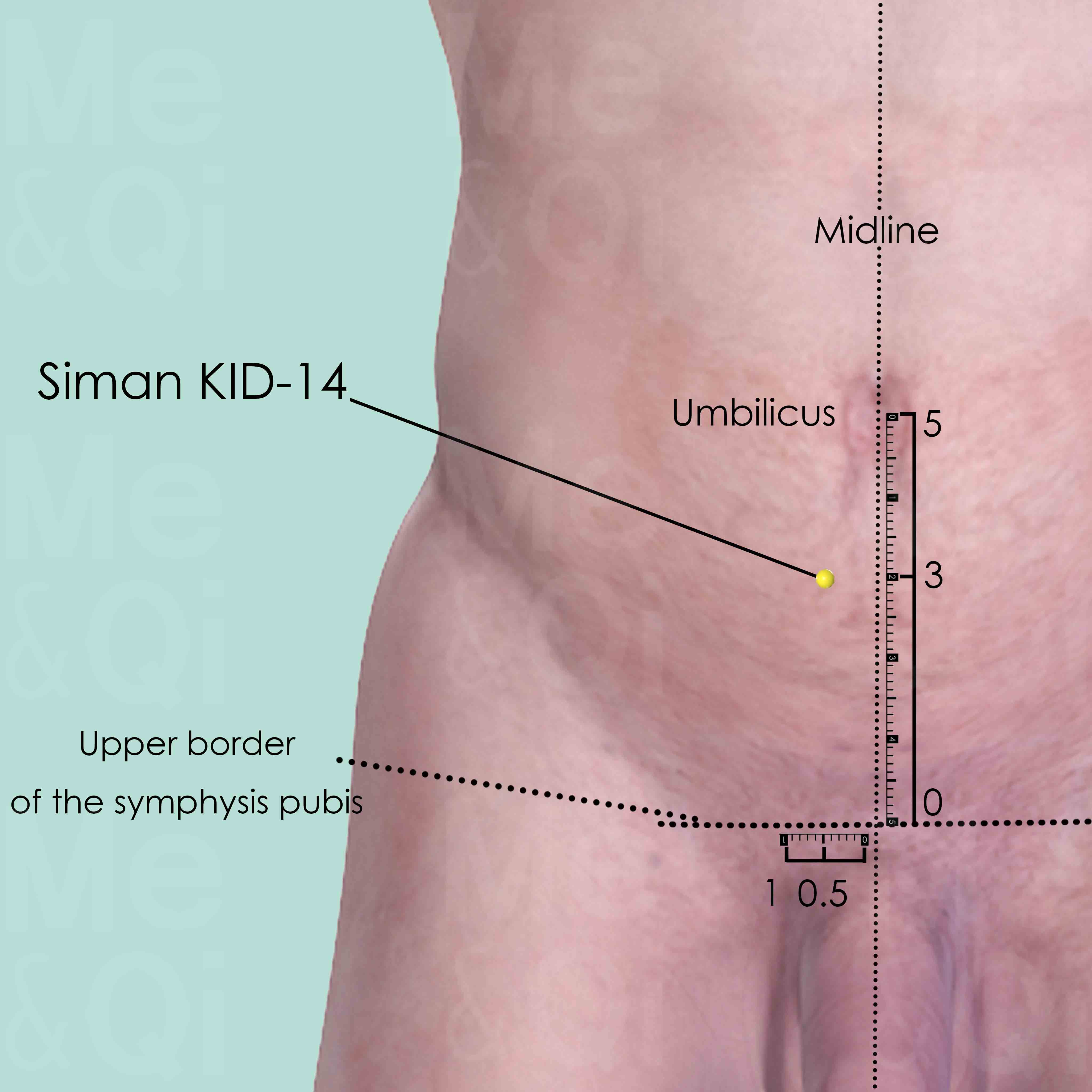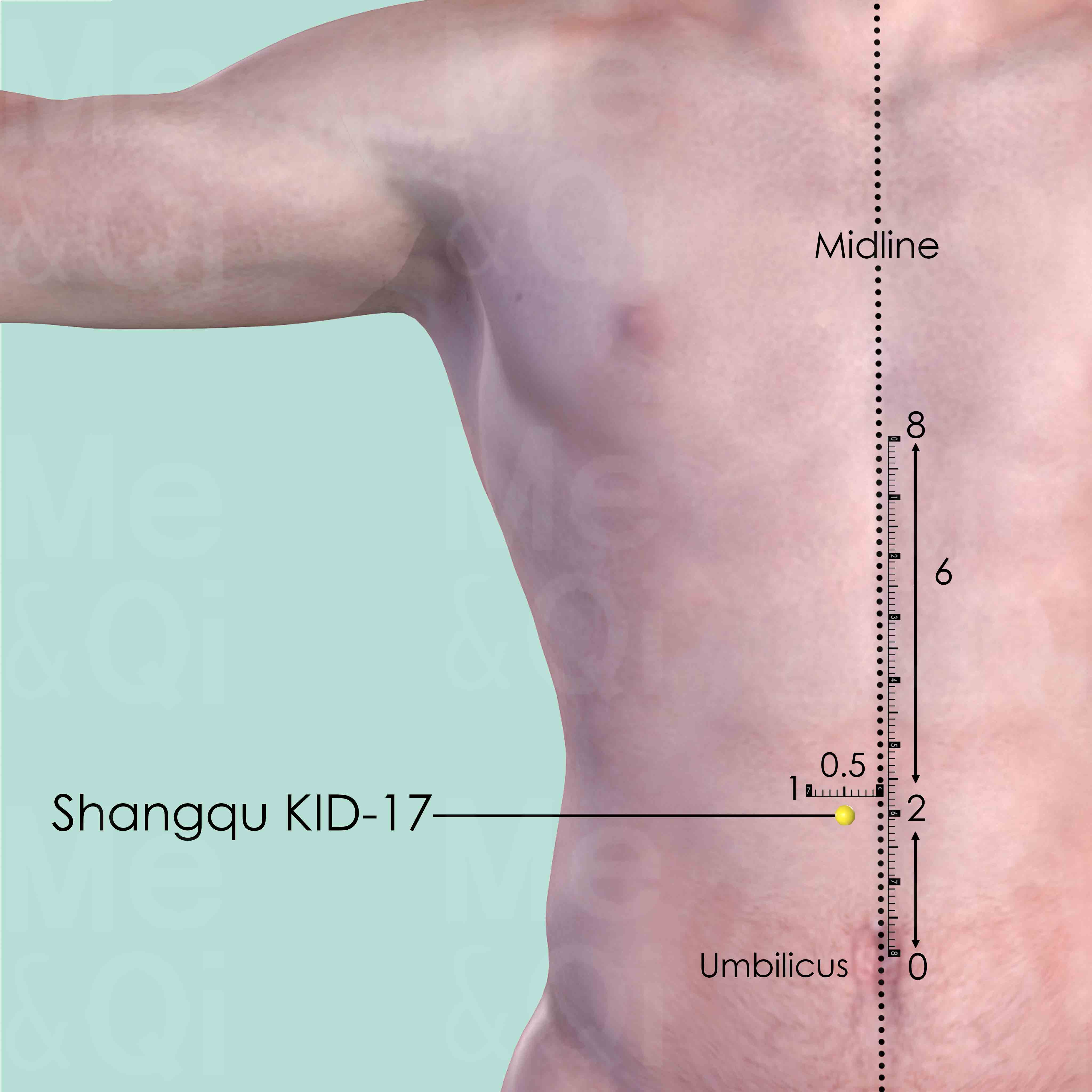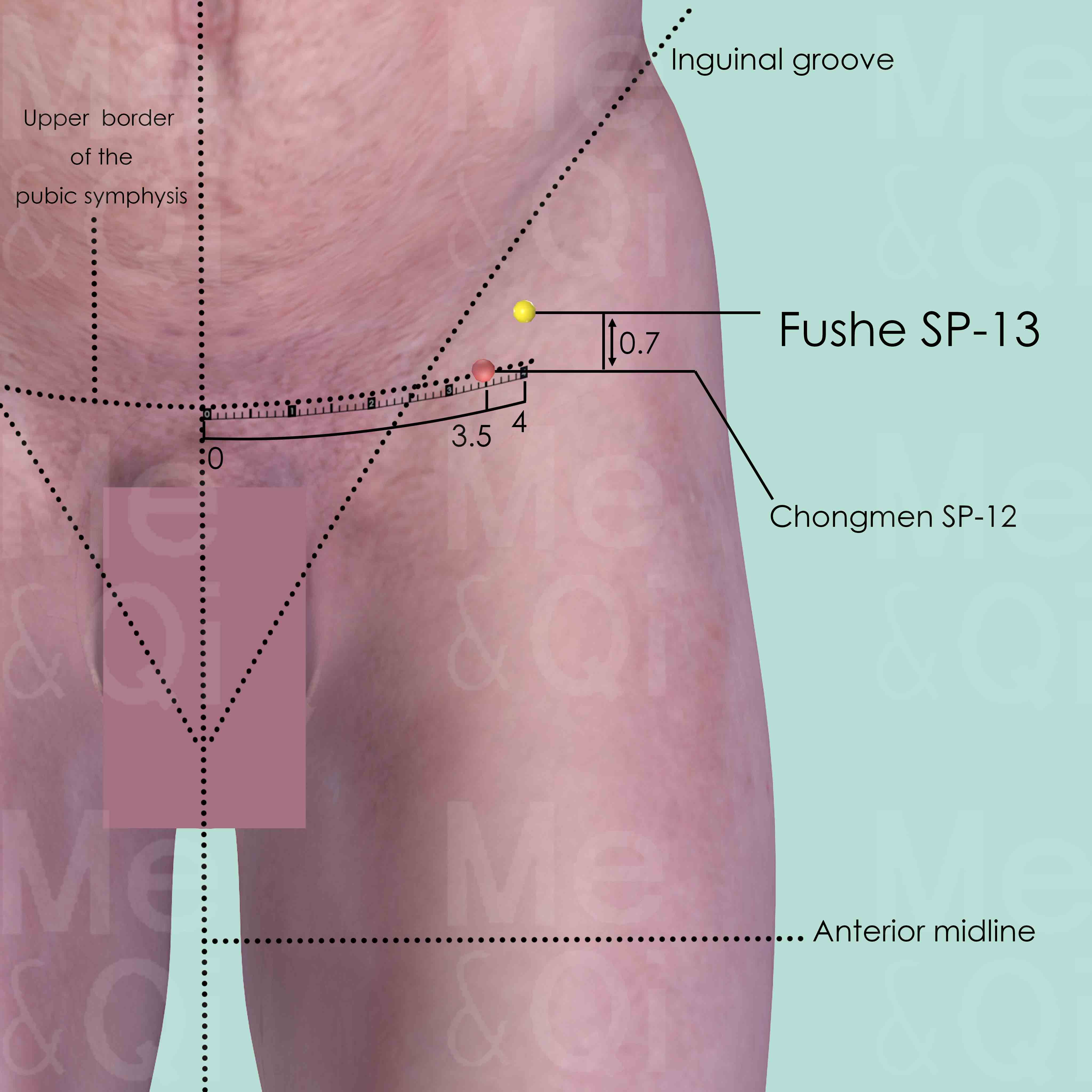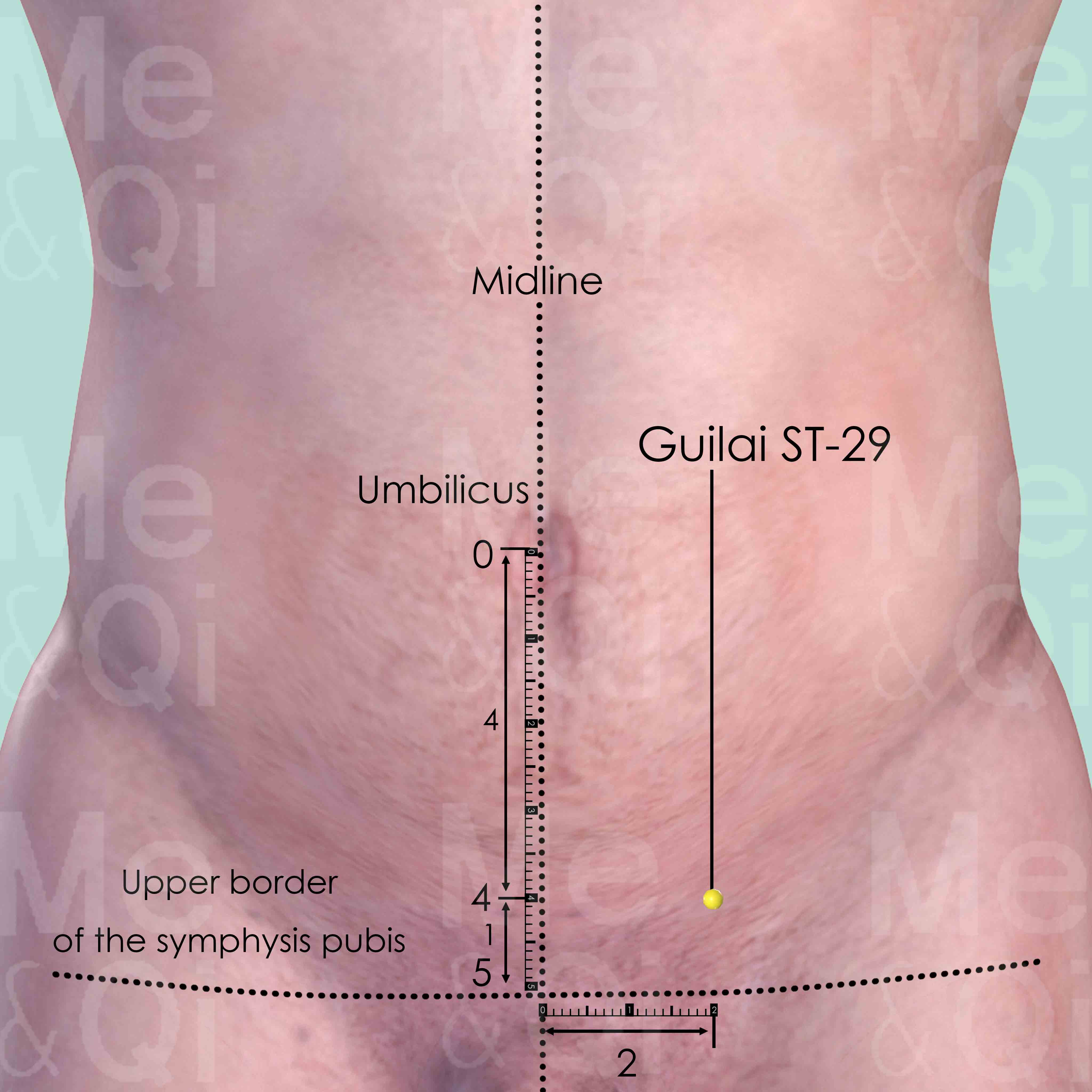Abdominal Massesaccording to TCM
Symptom families: Neoplasms, Tumors and Cancer, General Abdominal Pain and Discomfort
What are Abdominal Masses?
Abdominal masses are detectable swellings within the abdominal area, which may arise from various structures such as organs, tissues, or cysts. These masses can vary widely in their nature and severity, ranging from benign growths to serious malignancies. Symptoms accompanying these masses can include pain, bloating, or even no symptoms at all, often necessitating medical imaging for a clear diagnosis.
How does TCM view Abdominal Masses?
In Traditional Chinese Medicine (TCM), abdominal masses are seen as physical manifestations of internal disharmonies. The TCM perspective emphasizes the importance of Qi (vital energy) and Blood flow throughout the body.
Any disruption or Stagnation in these essential forces can lead to the formation of masses. TCM seeks to understand the underlying imbalances causing these blockages and to restore harmony through a variety of therapeutic approaches.
Root Causes of Abdominal Masses in TCM
TCM attributes the development of abdominal masses to several potential disharmonies within the body. The stagnation of Qi and Blood is often a primary concern, as it can result in the formation of palpable lumps and pain.
Blood Stasis, specifically, is characterized by fixed, stabbing pain and can be accompanied by a dark facial complexion and purple lips or nails. Additionally, factors such as emotional stress, improper diet, or external climatic influences may lead to Qi Stagnation, presenting with symptoms like chest distension and mood swings. Identifying the correct TCM pattern is crucial for effective treatment.
Explore below more details about what might cause Abdominal masses according to TCM.
- By Syndrome
- By Organ
- Blood Stasis
- Qi Stagnation
- Cold
- Liver
Blood Stasis
Blood Stasis in TCM is a concept where the blood flow in the body is not as smooth or efficient as it should be. Imagine a river that's supposed to flow freely, but instead, it's getting blocked or moving too slowly in some parts. This can lead to various health issues, like pain that feels sharp or stabbing, dark bruises, and a complexion that looks purplish. TCM believes that good health relies on the smooth and vibrant flow of Qi and blood throughout the body, so when blood gets stuck, it's like a traffic jam in your body, leading to discomfort or health problems.... see more
Blood Stasis Patterns That Can Lead to Abdominal Masses
Common Symptoms: Menstrual Cramps Dark Menstrual Clots Dark Menstrual Blood Irregular Periods Purple Lips Purple Nails Amenorrhea Abdominal Pain
| Pattern Name | Relevant Symptoms | Relevant Formulas |
|---|---|---|
| Blood Stagnation | Abdominal masses, Abdominal mass, Dark face, Purple lips, Stabbing fixed pain, Purple nails, Menstrual cramps, Dark menstrual clots, Dark menstrual blood, Lumps... see more | Tao He Cheng Qi Tang | Da Huang Mu Dan Pi Tang | Gui Zhi Fu Ling Wan | Di Dang Tang | Dan Shen Yin | Da Huang Zhe Chong Wan | San Zhong Kui Jian Tang | Hai Tong Pi Tang | Huang Qi Gui Zhi Wu Wu Tang |
| Liver Blood Stagnation | Abdominal masses, Hypochondriac pain, Abdominal pain, Vomiting blood, Nosebleeds, Menstrual cramps, Irregular periods, Dark menstrual clots, Infertility, Purple nails, Purple lips, Purple face, Skin dryness, Petechiae... see more | Xiao Yao San | Chai Hu Shu Gan San | Ge Xia Zhu Yu Tang | Shi Xiao San |
| Qi And Blood Stagnation | Abdominal masses, Chest distension, Chest pain, Stabbing fixed pain, Dark face, Purple lips, Purple nails, Irritability, Mood swings, Depression, Mottled skin, Foot edema, Melena black tarry stool, Menstrual cramps, Amenorrhea, Dark menstrual clots, Dark menstrual blood, Prolonged lochia, Irregular periods... see more | Dan Shen Yin | Chai Hu Shu Gan San | Ge Xia Zhu Yu Tang | Shi Xiao San | Xue Fu Zhu Yu Tang | Shen Tong Zhu Yu Tang | Shao Fu Zhu Yu Tang | Qi Li San | Guo Qi Yin |
| Blood Stagnation in the Directing and Penetrating Vessels | Abdominal masses, Irregular periods, Brown vaginal discharge, Dark menstrual clots, Menstrual cramps, Dark menstrual blood, Prolonged lochia, Lower abdominal pain, Umbilical pain, Breast engorgement, Breast pain... see more | Gui Zhi Fu Ling Wan |
| Blood Stagnation in the Lower Burner caused by Cold | Abdominal masses, Lower abdominal pain, Lower abdominal distension, Lower back pain, Abnormal uterine bleeding, Menstrual cramps, Dark menstrual clots... see more | Shao Fu Zhu Yu Tang |
Qi Stagnation
Qi Stagnation in TCM is like having a traffic jam in your body's energy system. Qi, the vital life force that flows through your body, is supposed to move smoothly to maintain health and balance. But with Qi Stagnation, this flow gets blocked or slowed down, like cars stuck on a highway. This can lead to symptoms like feeling stressed, emotional mood swings, and physical discomfort, often described as a feeling of fullness or tightness, especially in the chest or abdomen. It's as though the body's internal energy circulation is disrupted, causing various issues. TCM sees this as an energy flow problem, different from modern medicine's focus on specific physiological processes.... see more
Qi Stagnation Patterns That Can Lead to Abdominal Masses
| Pattern Name | Relevant Symptoms | Relevant Formulas |
|---|---|---|
| Qi And Blood Stagnation | Abdominal masses, Chest distension, Chest pain, Stabbing fixed pain, Dark face, Purple lips, Purple nails, Irritability, Mood swings, Depression, Mottled skin, Foot edema, Melena black tarry stool, Menstrual cramps, Amenorrhea, Dark menstrual clots, Dark menstrual blood, Prolonged lochia, Irregular periods... see more | Dan Shen Yin | Chai Hu Shu Gan San | Ge Xia Zhu Yu Tang | Shi Xiao San | Xue Fu Zhu Yu Tang | Shen Tong Zhu Yu Tang | Shao Fu Zhu Yu Tang | Qi Li San | Guo Qi Yin |
Cold
In TCM "Cold" as a pattern of disharmony refers to a specific type of imbalance within the body's systems, often linked to a deficiency or weakness. It's not about feeling physically cold or having a common cold, but rather a metaphorical description of certain symptoms and underlying conditions. When a TCM practitioner says someone suffers from "Cold," it usually implies that the body's Yang energy, which is warm and active, is insufficient or overpowered by Yin energy, which is cool and passive. Symptoms of Cold in TCM can include a general feeling of coldness, cold limbs, pale complexion, low energy, slow metabolism, and a preference for warmth. ... see more
Cold Patterns That Can Lead to Abdominal Masses
| Pattern Name | Relevant Symptoms | Relevant Formulas |
|---|---|---|
| Blood Stagnation in the Lower Burner caused by Cold | Abdominal masses, Lower abdominal pain, Lower abdominal distension, Lower back pain, Abnormal uterine bleeding, Menstrual cramps, Dark menstrual clots... see more | Shao Fu Zhu Yu Tang |
Liver
In TCM the Liver is viewed as the organ responsible for the smooth flow of Qi, Blood, and emotions throughout the body. It plays a key role in regulating mood, storing blood, supporting digestion, and ensuring the health of tendons and eyes. When the Liver malfunctions or is imbalanced in TCM, it can lead to a range of issues such as irritability, mood swings, menstrual irregularities, eye problems, and muscular stiffness or pain. A malfunctioning Liver in TCM reflects not only physical disturbances but also emotional and mental disharmony, emphasizing the holistic approach of TCM in addressing health and wellness.... see more
Liver Patterns That Can Lead to Abdominal Masses
| Pattern Name | Relevant Symptoms | Relevant Formulas |
|---|---|---|
| Liver Blood Stagnation | Abdominal masses, Hypochondriac pain, Abdominal pain, Vomiting blood, Nosebleeds, Menstrual cramps, Irregular periods, Dark menstrual clots, Infertility, Purple nails, Purple lips, Purple face, Skin dryness, Petechiae... see more | Xiao Yao San | Chai Hu Shu Gan San | Ge Xia Zhu Yu Tang | Shi Xiao San |
TCM Herbal Formulas for Abdominal Masses
In addressing abdominal masses, TCM practitioners often turn to herbal formulas designed to invigorate Qi and Blood, dispel Stagnation, and dissolve accumulations. For example, Tao He Cheng Qi Tang, a formula that invigorates Blood and dispels Blood Stagnation, may be used for masses characterized by stabbing pain and dark clots. This formula contains Peach Kernels (Tao Ren), known for their blood-invigorating properties.
Similarly, for Liver Blood Stagnation, a formula like Xiao Yao San, which harmonizes Liver-Spleen and includes Bupleurum Roots (Chai Hu), might be recommended. These herbs and formulas are chosen based on the specific TCM diagnosis and the individual's unique pattern of imbalance.
Explore below some TCM herbal formulas used to address abdominal masses, organized by cause and by formula type.
- By Cause
- By Formula Type
- Blood Stasis
- Qi Stagnation
- Cold
- Formulas that invigorate blood and dispel blood stagnation
- Formulas that clear internal abscesses and sores
- Formulas that clear external abscesses and sores
- External formulas for external disorders
- Formulas that warm the meridians and disperse cold
- Formulas that harmonize liver-Spleen
- Formulas that promote qi movement
- Formulas that regulate blood
- Formulas that tonify blood
Top Formula for Blood Stasis:
Gui Zhi Fu Ling Wan
Suitable for Blood Stasis patterns that may cause abdominal masses, such as Blood Stagnation or Blood Stagnation in the Directing and Penetrating Vessels
Learn moreAll Formulas Recommended for Abdominal Masses Caused by Blood Stasis
| Formula | Patterns Suitable For |
|---|---|
| Gui Zhi Fu Ling Wan | Blood Stagnation, Blood Stagnation in the Directing and Penetrating Vessels |
| Dan Shen Yin | Blood Stagnation, Qi And Blood Stagnation |
| Chai Hu Shu Gan San | Liver Blood Stagnation, Qi And Blood Stagnation |
| Ge Xia Zhu Yu Tang | Liver Blood Stagnation, Qi And Blood Stagnation |
| Shi Xiao San | Liver Blood Stagnation, Qi And Blood Stagnation |
| Shao Fu Zhu Yu Tang | Qi And Blood Stagnation, Blood Stagnation in the Lower Burner caused by Cold |
| Tao He Cheng Qi Tang | Blood Stagnation |
| Da Huang Mu Dan Pi Tang | Blood Stagnation |
| Di Dang Tang | Blood Stagnation |
| Da Huang Zhe Chong Wan | Blood Stagnation |
| San Zhong Kui Jian Tang | Blood Stagnation |
| Hai Tong Pi Tang | Blood Stagnation |
| Huang Qi Gui Zhi Wu Wu Tang | Blood Stagnation |
| Xiao Yao San | Liver Blood Stagnation |
| Xue Fu Zhu Yu Tang | Qi And Blood Stagnation |
| Shen Tong Zhu Yu Tang | Qi And Blood Stagnation |
| Qi Li San | Qi And Blood Stagnation |
| Guo Qi Yin | Qi And Blood Stagnation |
Top Formula for Qi Stagnation:
Dan Shen Yin
Suitable for Qi Stagnation patterns that may cause abdominal masses, such as Qi And Blood Stagnation
Learn moreAll Formulas Recommended for Abdominal Masses Caused by Qi Stagnation
| Formula | Patterns Suitable For |
|---|---|
| Dan Shen Yin | Qi And Blood Stagnation |
| Chai Hu Shu Gan San | Qi And Blood Stagnation |
| Ge Xia Zhu Yu Tang | Qi And Blood Stagnation |
| Shi Xiao San | Qi And Blood Stagnation |
| Shao Fu Zhu Yu Tang | Qi And Blood Stagnation |
| Xue Fu Zhu Yu Tang | Qi And Blood Stagnation |
| Shen Tong Zhu Yu Tang | Qi And Blood Stagnation |
| Qi Li San | Qi And Blood Stagnation |
| Guo Qi Yin | Qi And Blood Stagnation |
Top Formula for Cold:
Shao Fu Zhu Yu Tang
Suitable for Cold patterns that may cause abdominal masses, such as Blood Stagnation in the Lower Burner caused by Cold
Learn moreFormulas that invigorate Blood and dispel Blood Stagnation
These formulas are suitable for some abdominal masses-causing patterns like Blood Stagnation or Blood Stagnation in the Directing and Penetrating Vessels.
One such formula is Gui Zhi Fu Ling Wan, with cinnamon twigs as a key herb.
Other formulas of this category are listed in the table below.
All "formulas that invigorate blood and dispel blood stagnation" recommended for abdominal masses
| Formula | Patterns Suitable For (if applicable) |
|---|---|
| Gui Zhi Fu Ling Wan | Blood Stagnation, Blood Stagnation in the Directing and Penetrating Vessels |
| Dan Shen Yin | Blood Stagnation, Qi And Blood Stagnation |
| Ge Xia Zhu Yu Tang | Liver Blood Stagnation, Qi And Blood Stagnation |
| Shi Xiao San | Liver Blood Stagnation, Qi And Blood Stagnation |
| Shao Fu Zhu Yu Tang | Qi And Blood Stagnation, Blood Stagnation in the Lower Burner caused by Cold |
| Tao He Cheng Qi Tang | Blood Stagnation |
| Di Dang Tang | Blood Stagnation |
| Da Huang Zhe Chong Wan | Blood Stagnation |
| Xue Fu Zhu Yu Tang | Qi And Blood Stagnation |
| Qi Li San | Qi And Blood Stagnation |
Formulas that promote Qi movement
These formulas are suitable for some abdominal masses-causing patterns like Liver Blood Stagnation or Qi And Blood Stagnation.
One such formula is Chai Hu Shu Gan San, with bupleurum root as a key herb.
Formulas that clear internal abscesses and sores
These formulas are suitable for some abdominal masses-causing patterns like Blood Stagnation.
One such formula is Da Huang Mu Dan Pi Tang, with rhubarb as a key herb.
Formulas that clear external abscesses and sores
These formulas are suitable for some abdominal masses-causing patterns like Blood Stagnation.
One such formula is San Zhong Kui Jian Tang, with phellodendron bark as a key herb.
External formulas for External disorders
These formulas are suitable for some abdominal masses-causing patterns like Blood Stagnation.
One such formula is Hai Tong Pi Tang, with erythrinae bark as a key herb.
Formulas that warm the Meridians and disperse Cold
These formulas are suitable for some abdominal masses-causing patterns like Blood Stagnation.
One such formula is Huang Qi Gui Zhi Wu Wu Tang, with milkvetch root as a key herb.
Formulas that harmonize Liver-Spleen
These formulas are suitable for some abdominal masses-causing patterns like Liver Blood Stagnation.
One such formula is Xiao Yao San, with bupleurum root as a key herb.
Formulas that regulate Blood
These formulas are suitable for some abdominal masses-causing patterns like Qi And Blood Stagnation.
One such formula is Shen Tong Zhu Yu Tang, with peach kernel as a key herb.
Formulas that tonify Blood
These formulas are suitable for some abdominal masses-causing patterns like Qi And Blood Stagnation.
One such formula is Guo Qi Yin, with dong quai as a key herb.
Acupoints for Abdominal Masses
TCM incorporates acupuncture as a key component in treating abdominal masses. Selecting the appropriate acupoints aims to restore the flow of Qi and Blood, addressing the stagnation that contributes to mass formation.
Points on the Directing Vessel, such as Xiawan REN-10, are targeted to descend Stomach Qi and ease digestive issues, while Yinjiao REN-7 is chosen to regulate menstruation and Qi in the lower abdomen. Acupuncture, combined with dietary modifications and lifestyle adjustments, forms a comprehensive approach to resolving abdominal masses and their underlying causes.
Explore below some acupoints used to address abdominal masses, organized by meridian.
- By Meridian
- Directing Vessel
- Bladder Channel
- Kidney Channel
- Spleen Channel
- Liver Channel
- Stomach Channel
- Governing Vessel
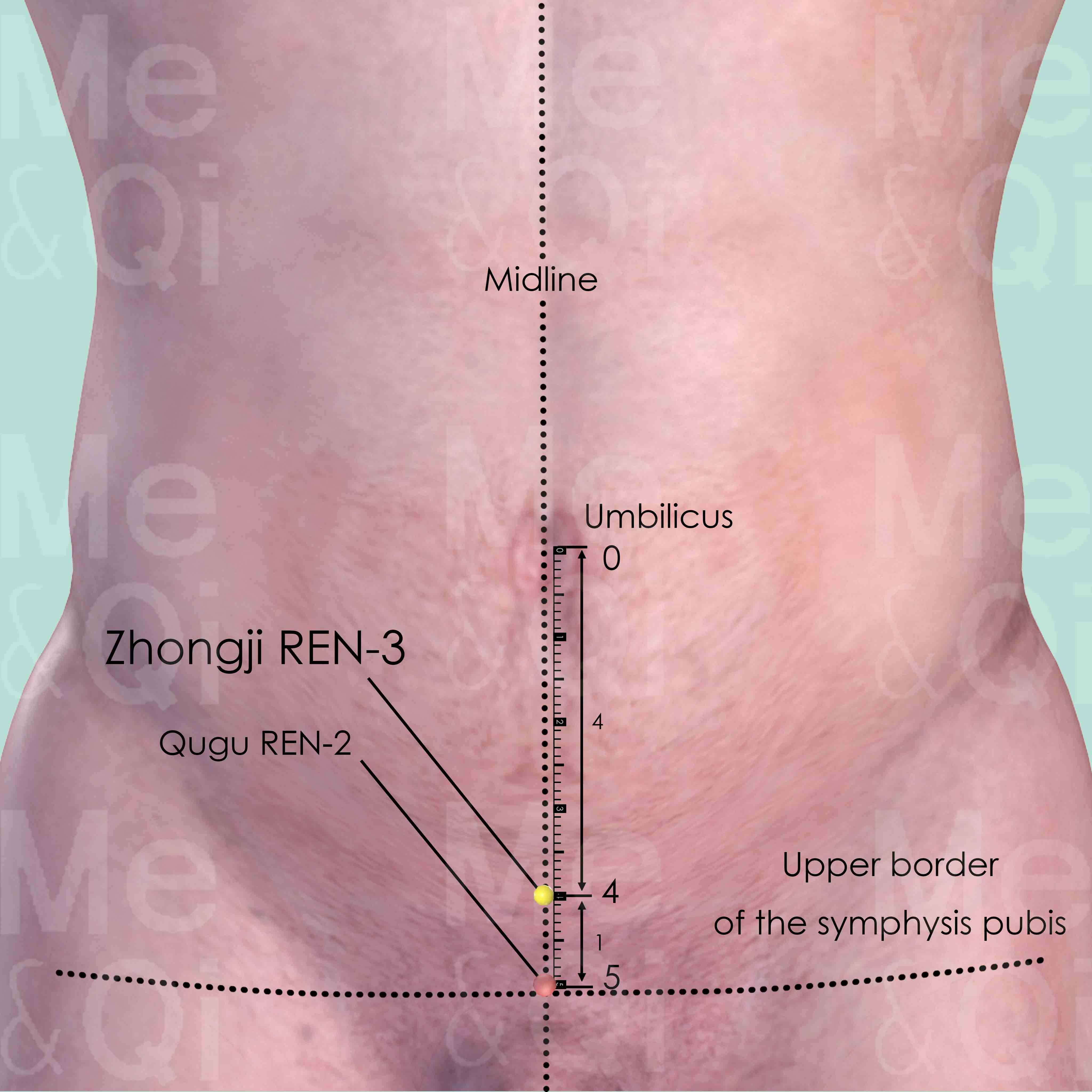
Zhongji REN-3
On the anterior midline, 4 cun below the umbilicus, 1 cun above Qugu REN-2, which is located at the upper border of the symphysis pubis.
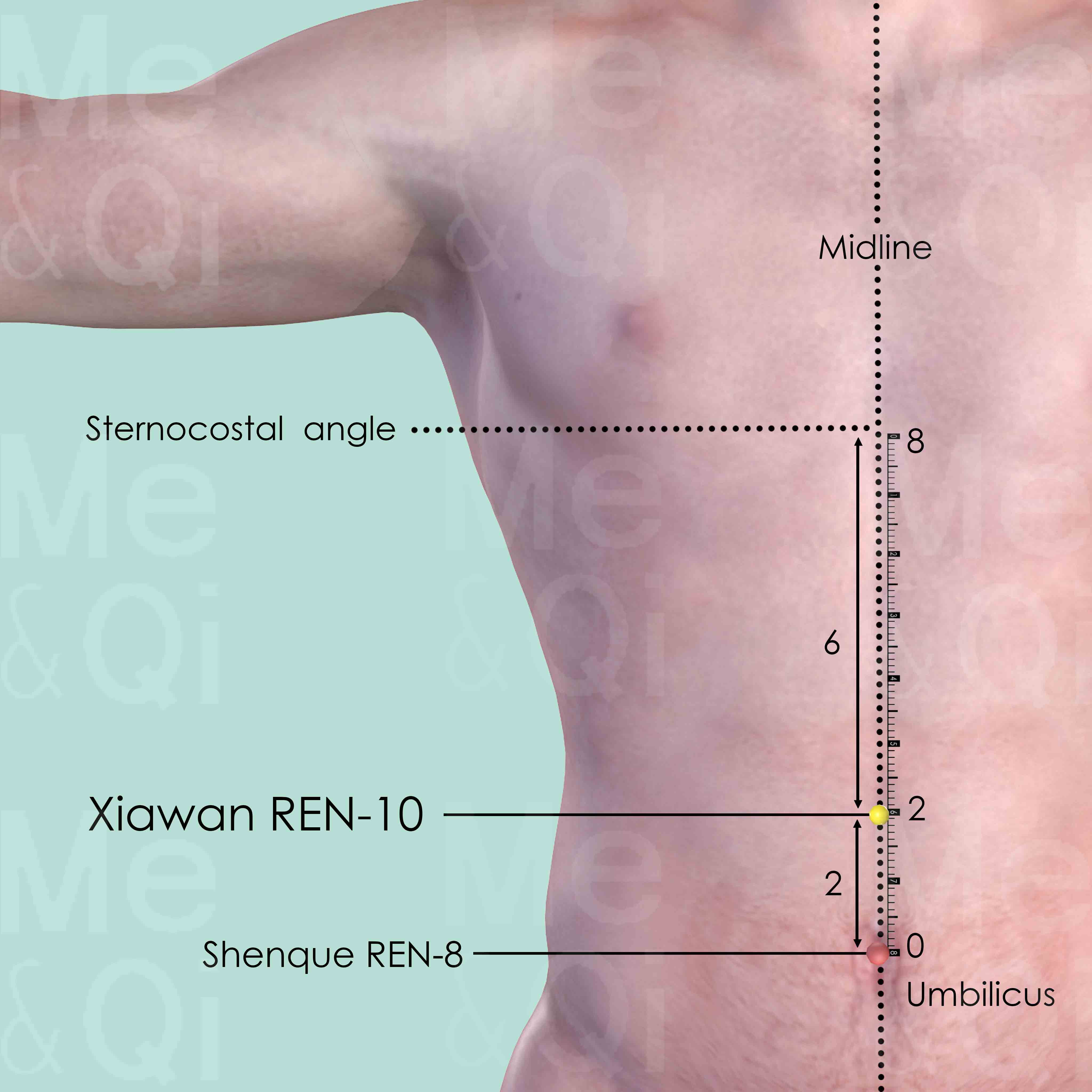
Xiawan REN-10
On the midline of the abdomen, 2 cun above the umbilicus and 6 cun below the sternocostal angle.
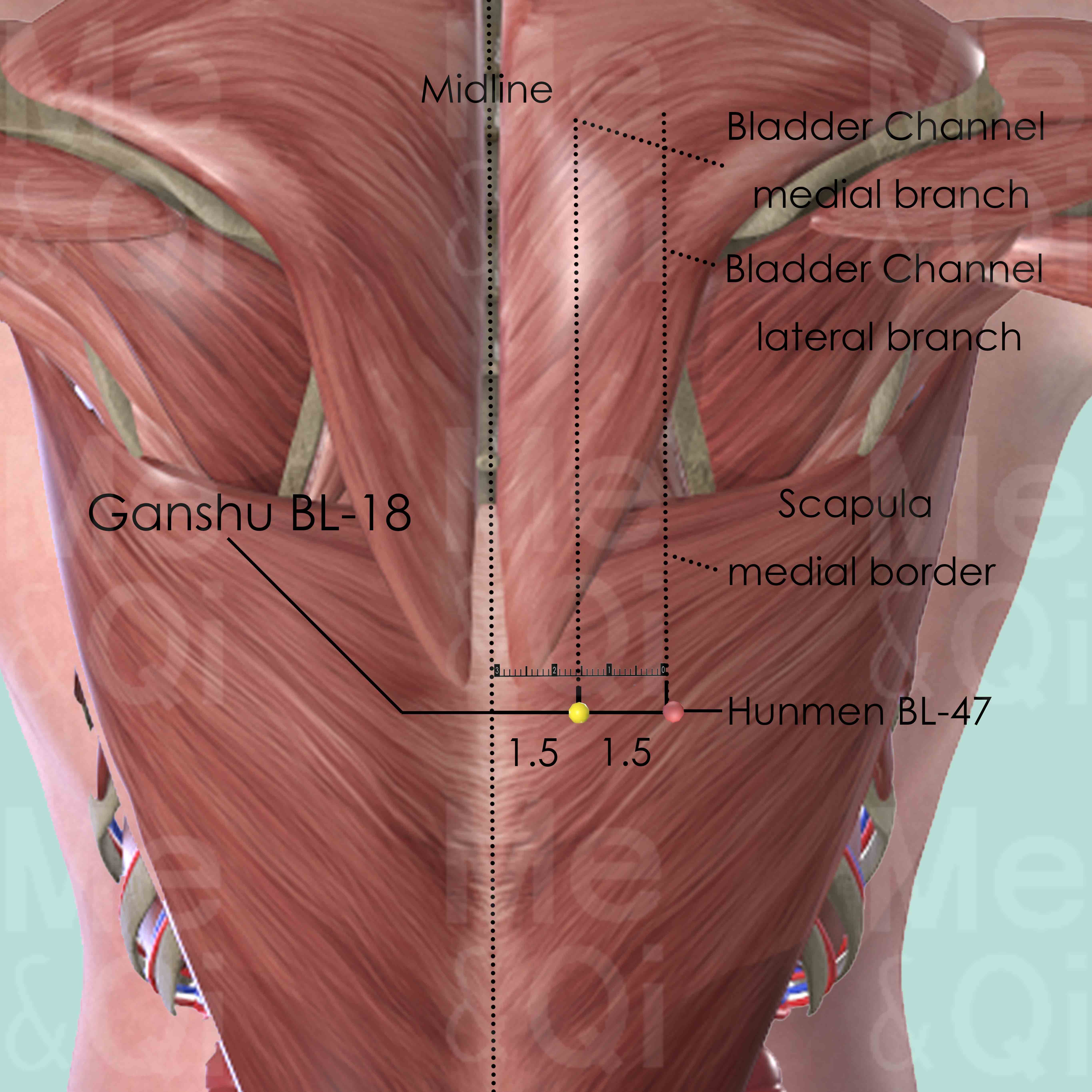
Ganshu BL-18
1.5 cun lateral to the lower border of the spinous process of the 9th thoracic vertebra (T9).
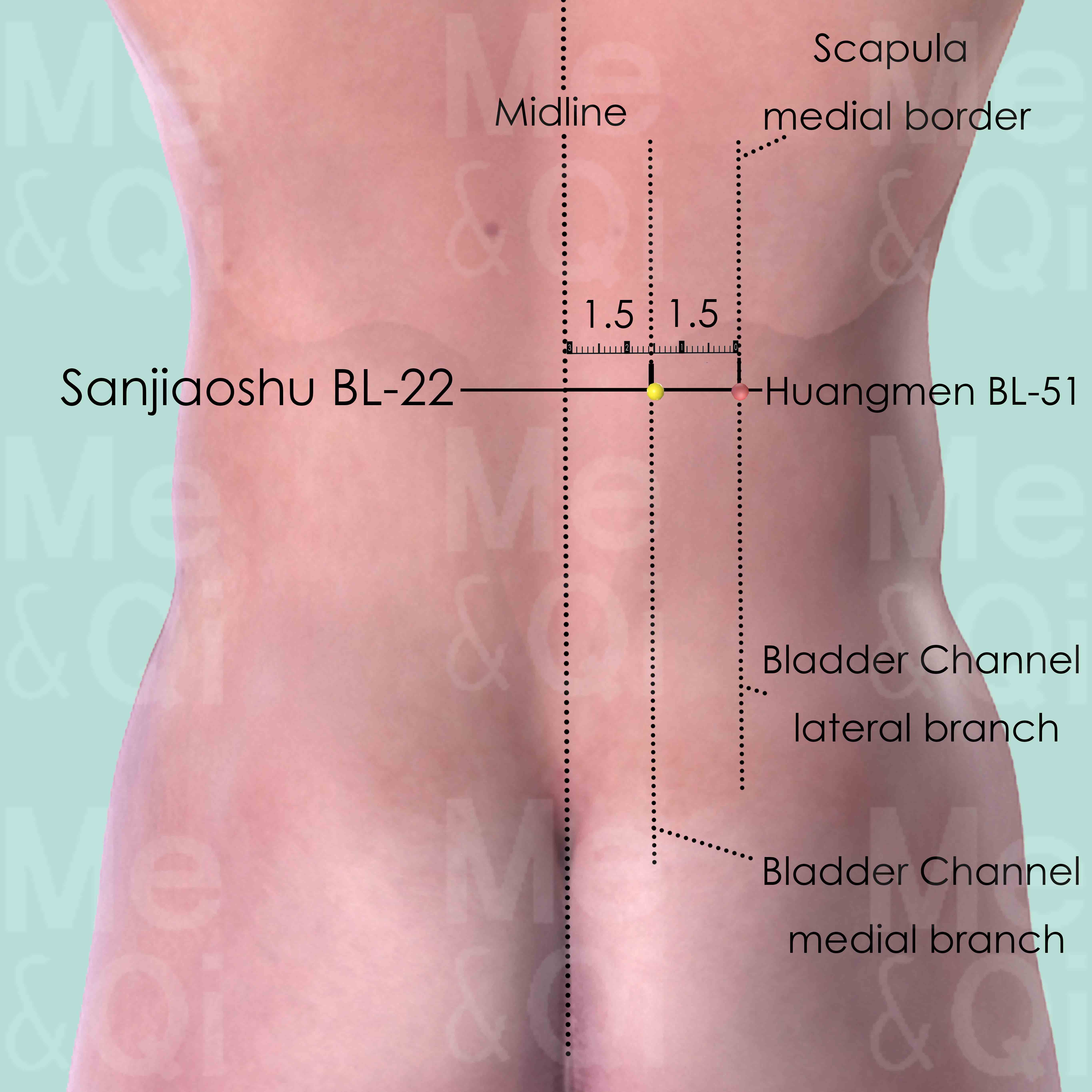
Sanjiaoshu BL-22
1.5 cun lateral to the lower border of the spinous process of the 1st lumbar vertebra.
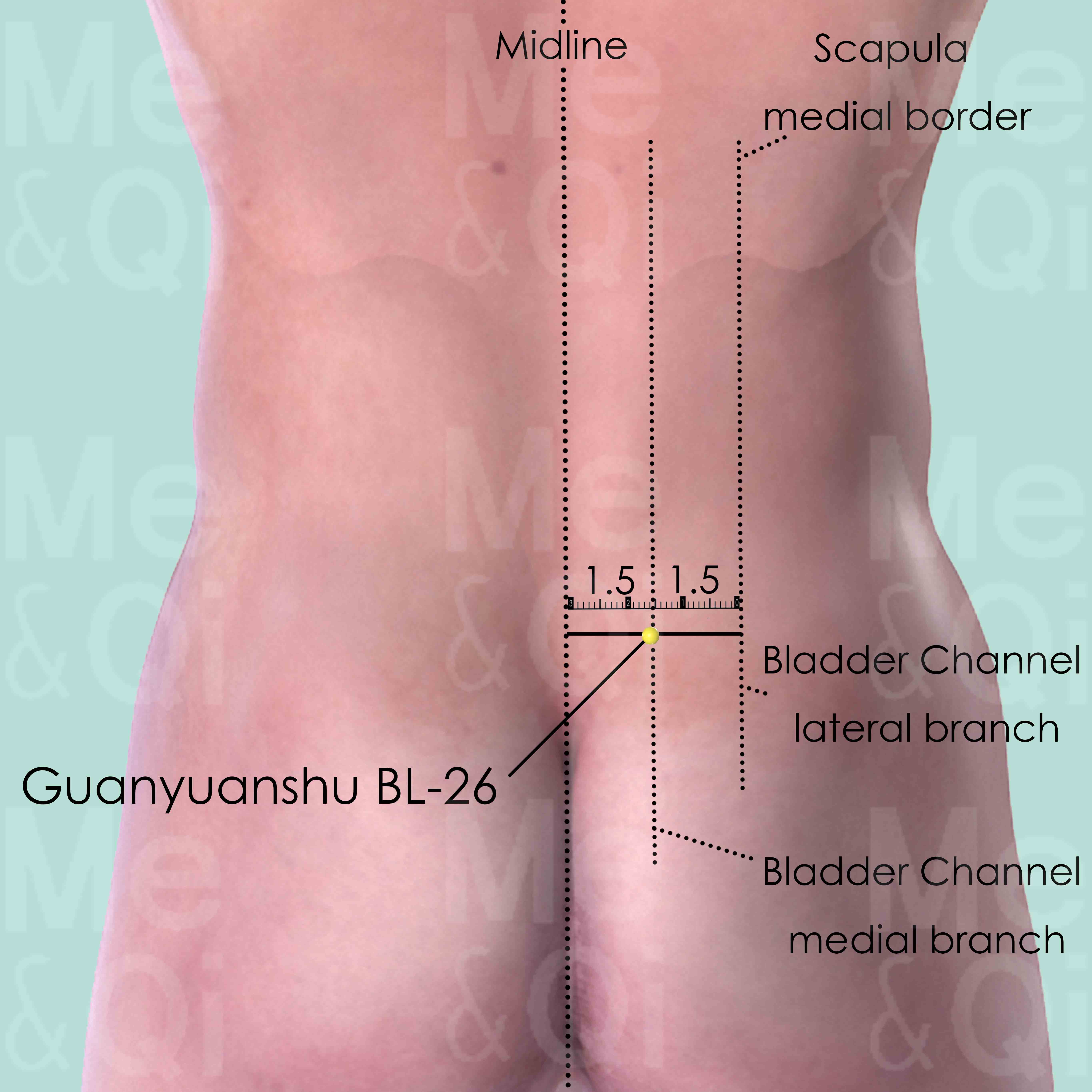
Guanyuanshu BL-26
1.5 cun lateral to the lower border of the spinous process of the 5th lumber vertebra (L5).
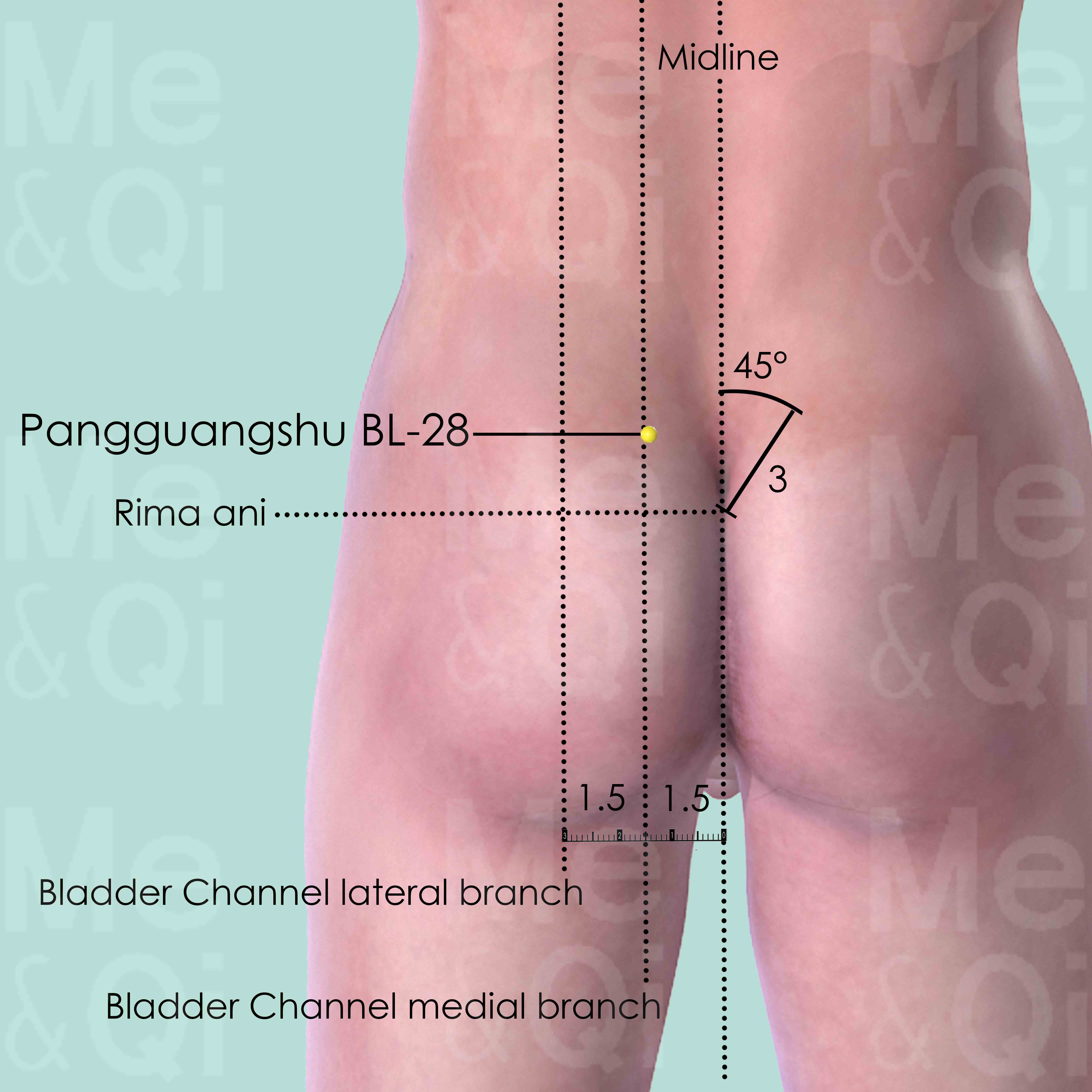
Pangguangshu BL-28
At the level of the 2nd posterior sacral foramen, 1.5 cun lateral to the posterior midline, in the depression between the medial border of the posterior superior iliac spine (PSIS) and the sacrum.
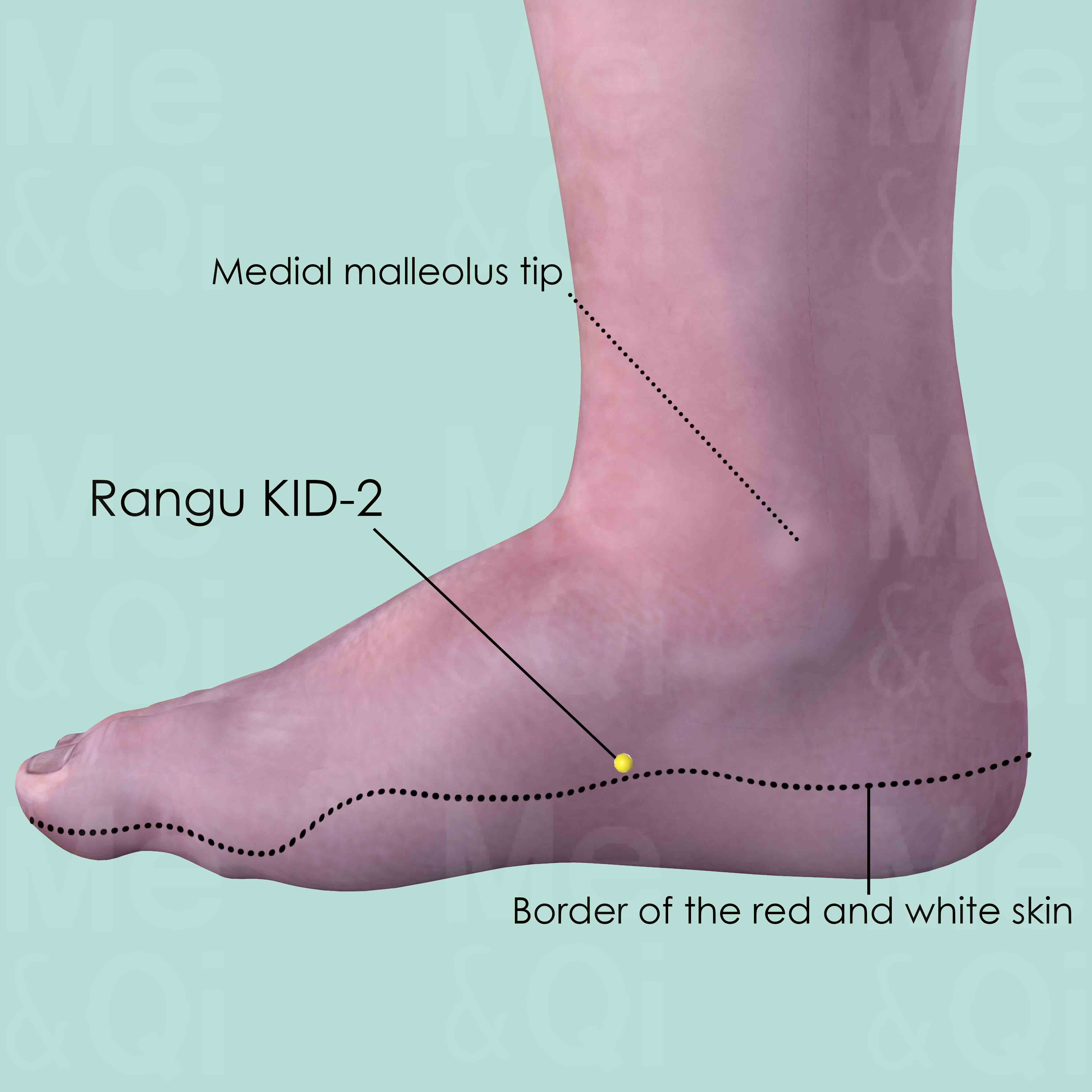
Rangu KID-2
Anterior and inferior to the medial malleolus tip, in the depression on the lower border of the navicular bone, at the border of the 'red and white' skin.
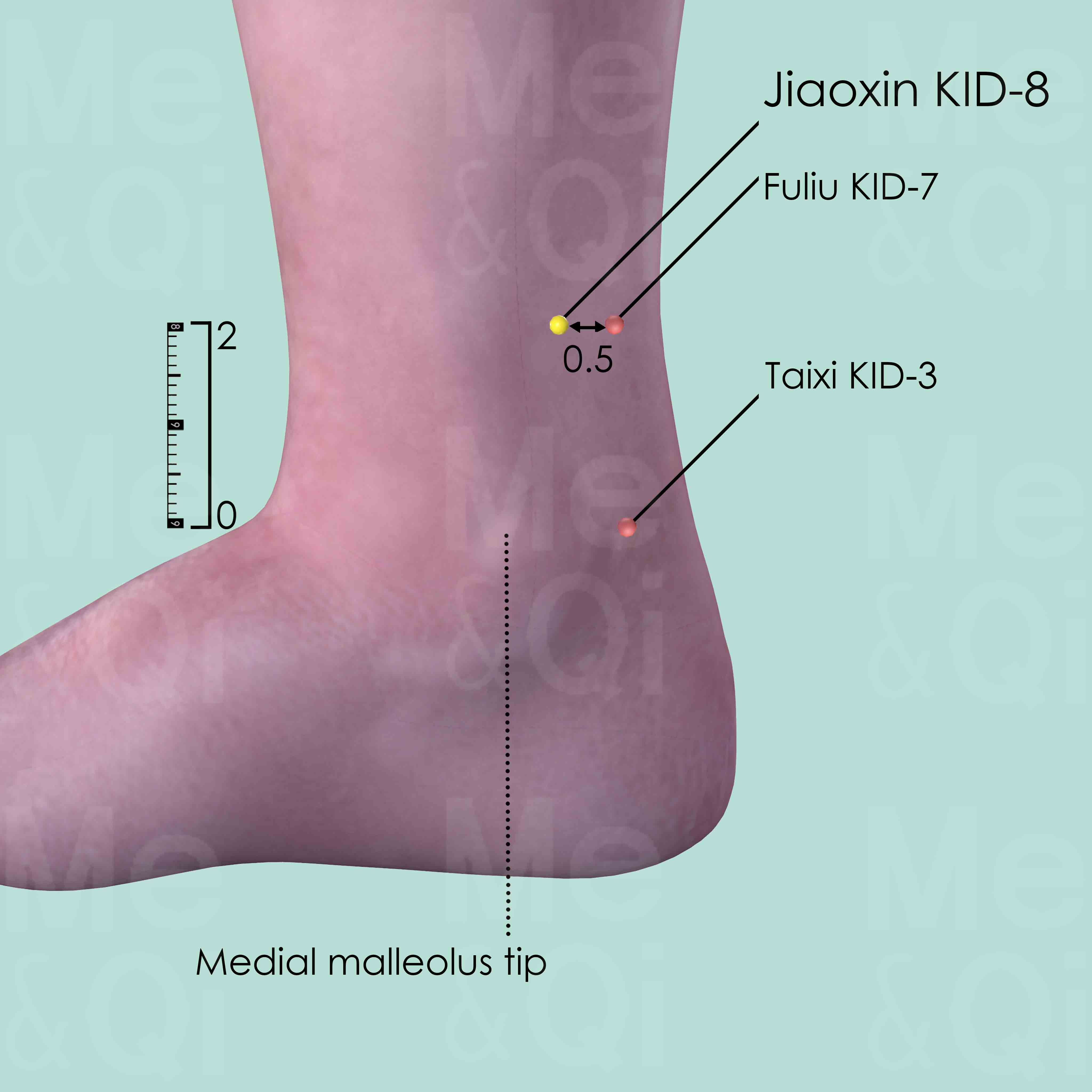
Jiaoxin KID-8
2 cun above Taixi KID-3, 0.5 cun anterior to Fuliu KID-7, posterior to the medial border of tibia.
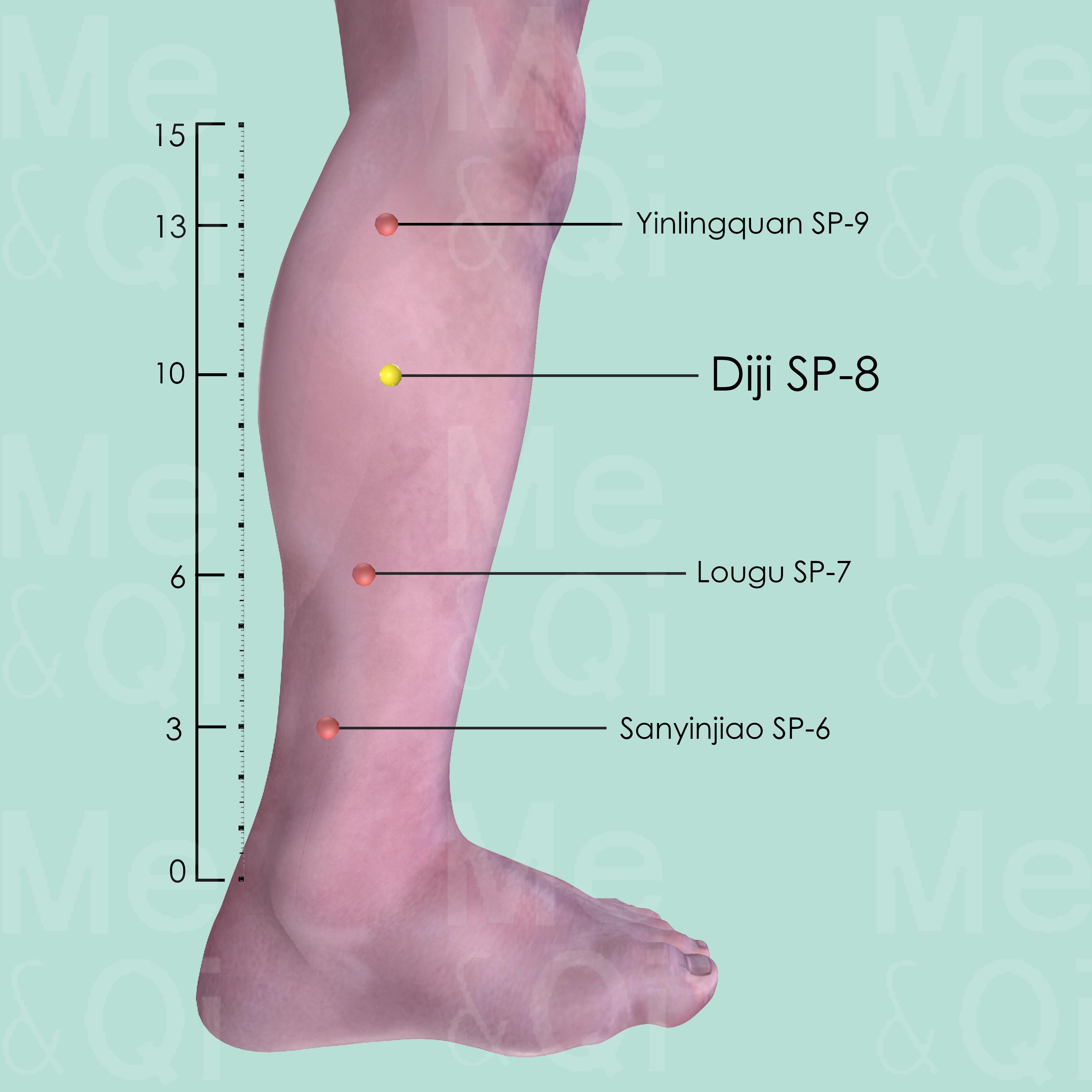
Diji SP-8
3 cun below the medial condyle of the tibia, on the line connecting Yinlingquan SP-9 and the the medial malleolus.
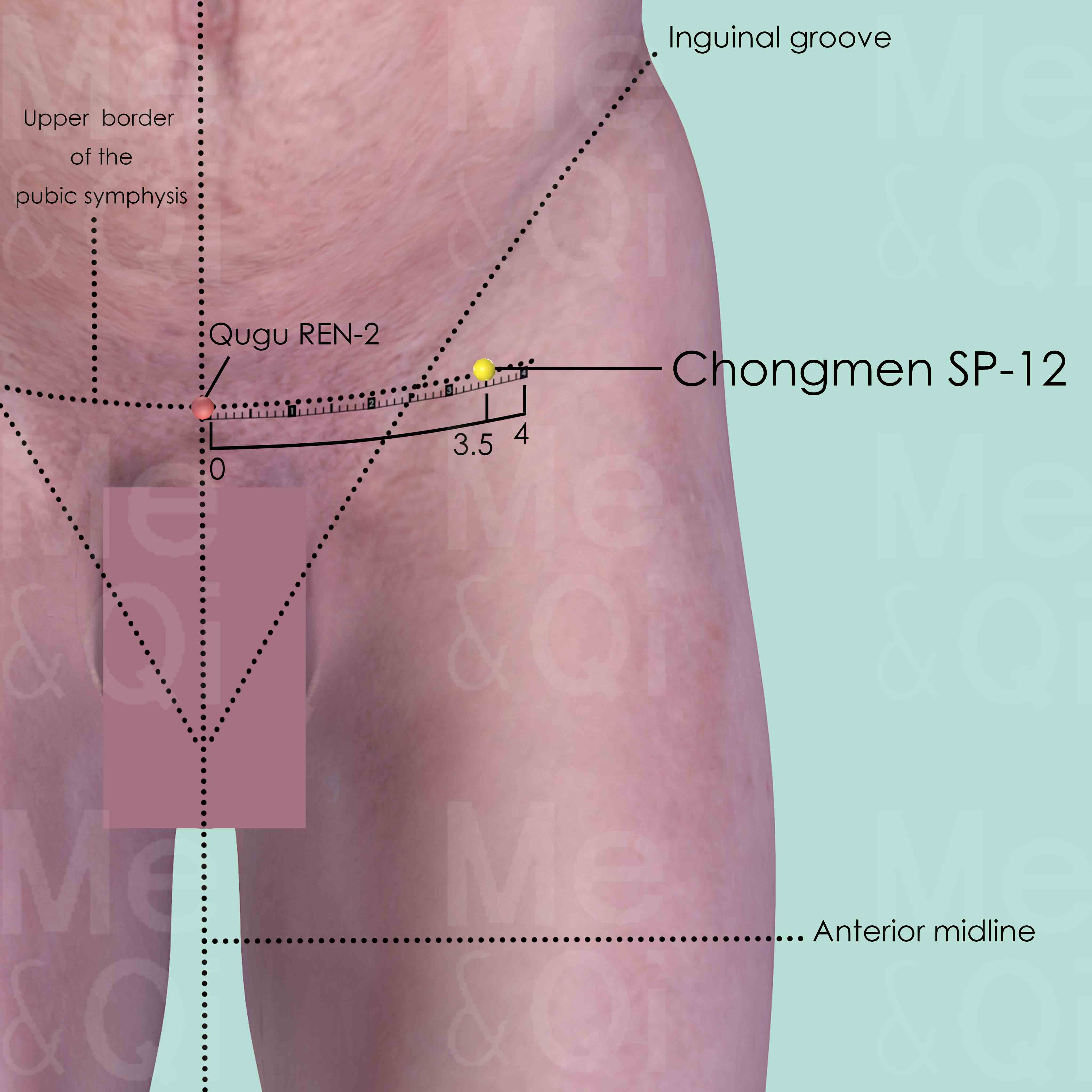
Chongmen SP-12
Lateral to the inguinal groove, on the immediate lateral side of the femoral artery, at the level of the upper border of symphysis pubis, 3.5 cun lateral to Qugu REN-2.
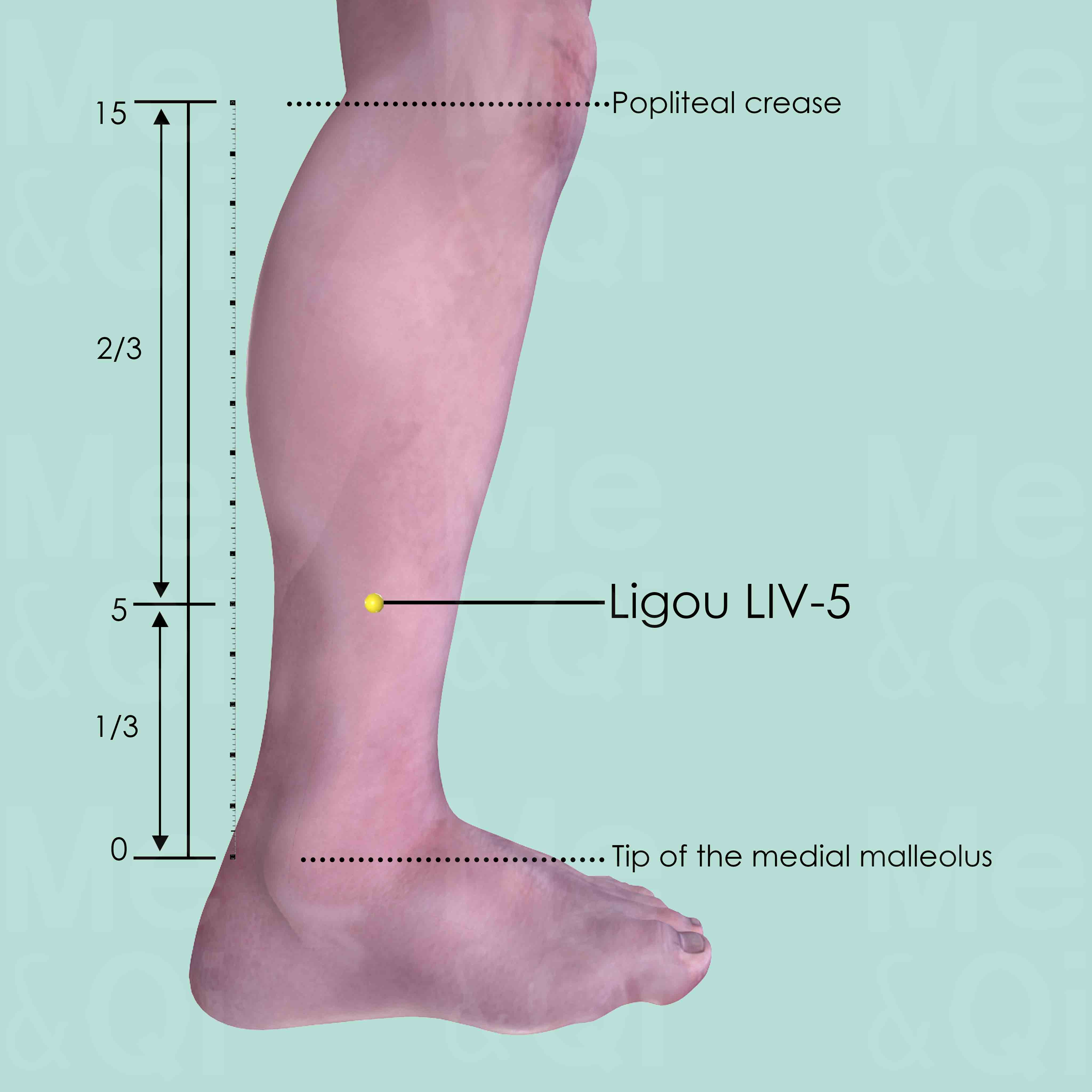
Ligou LIV-5
5 cun above the tip of the medial malleolus, on the medial aspect and posterior to the medial crest of the tibia.
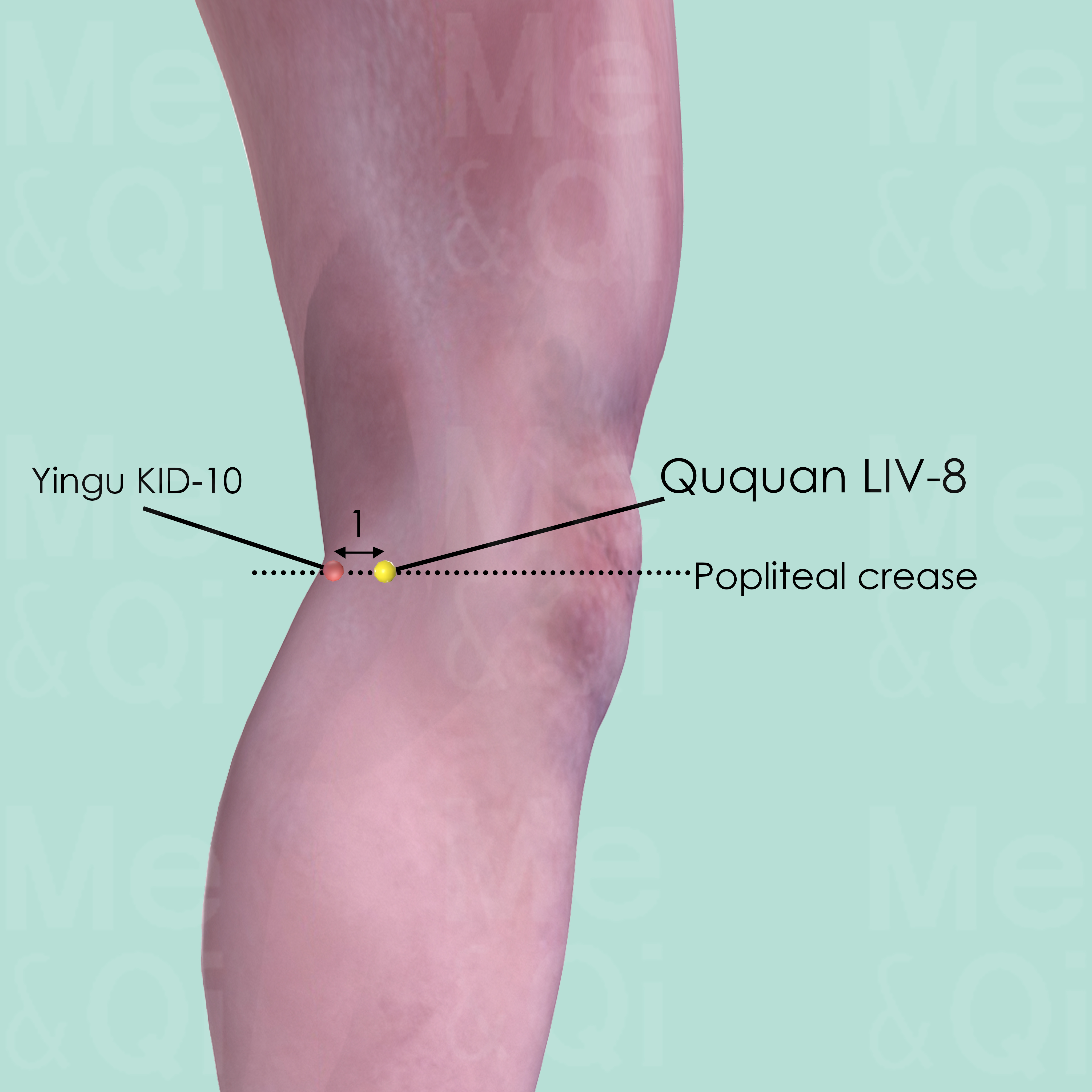
Ququan LIV-8
On the medial aspect of the knee join. Flex the knee and locate the point above the medial end of the popliteal crease, posterior to the medial condyle of the tibia, on the anterior border of the insertion of semimembranosus and semitendinosus muscle, about 1 cun anterior to Yingu KID-10.
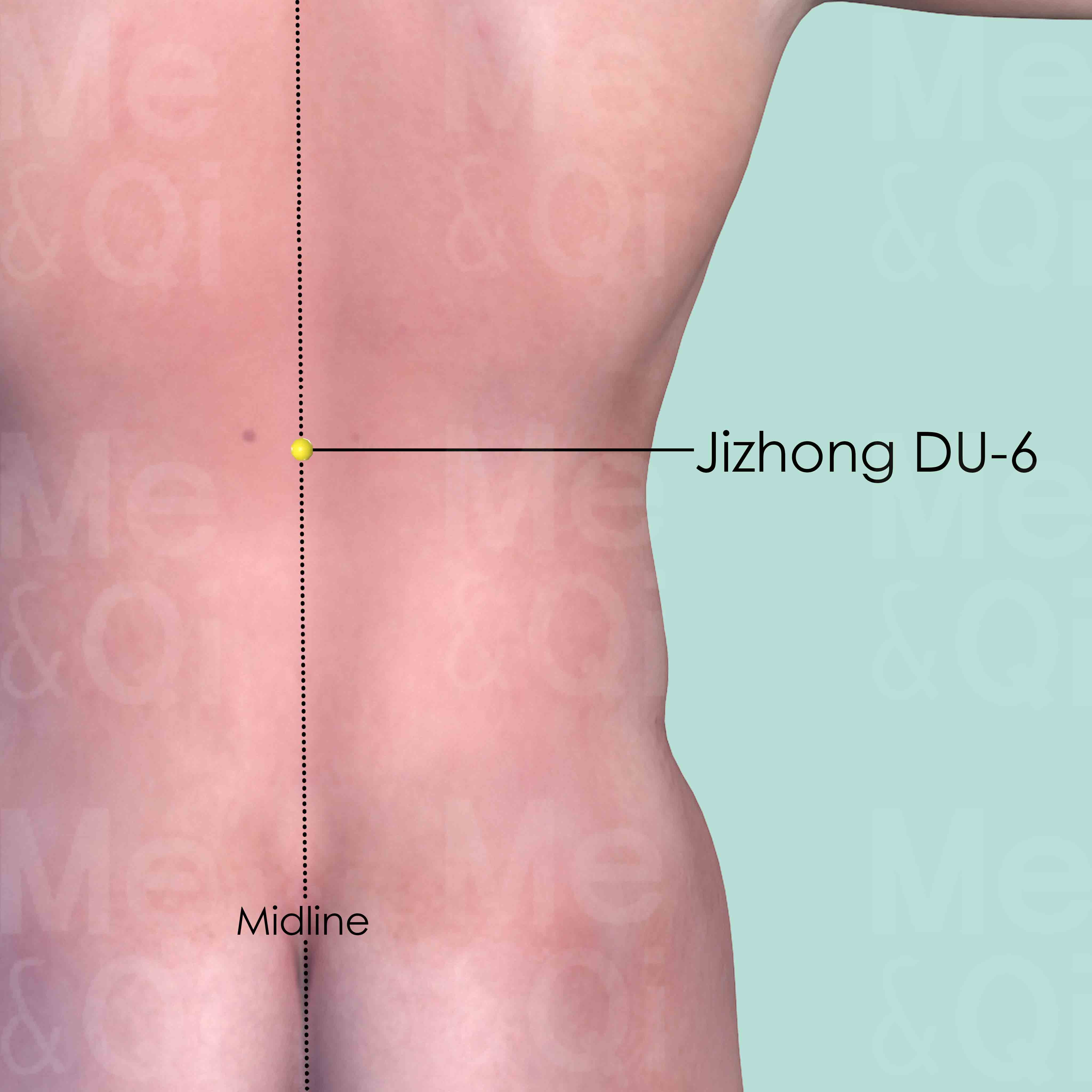
Jizhong DU-6
On the back midline, in the depression below the spinous process of the 11th thoracic vertebra (T11).

